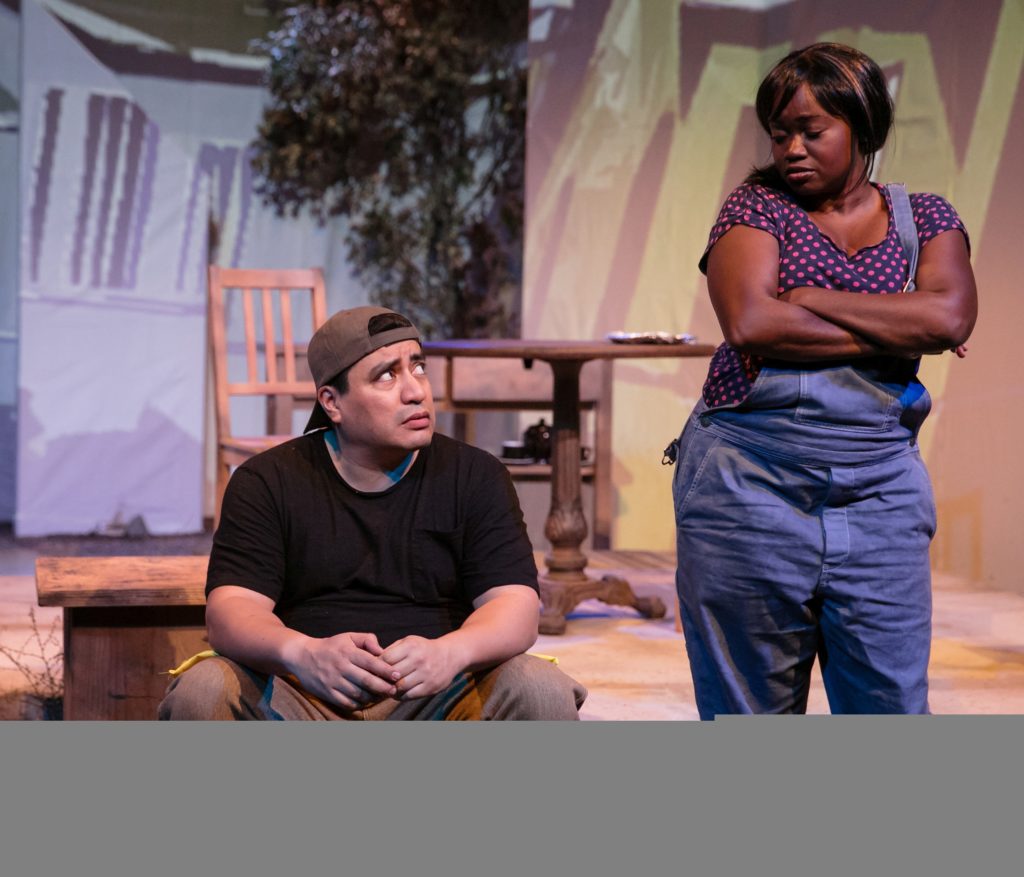Culture & Media
Epoch Story: A Stage Chronicle of Watts
A new historical play looks at a disputed tract of land that would eventually become Watts.

Cheryl Umaña and Jeff Torres as Toya and Enrique. (Photo: Grettel Cortes Photography)
Early on in Evangeline Ordáz’s engaging and arrestingly mounted historical melodrama, an altercation ensues between Toya (Cheryl Umaña), a proud and angry Indian princess, and Enrique (Jeff Torres) the amiable son of a Mexican landowner. The year is 1843 and the issue is water; Enrique’s father, who was “granted” the land that had belonged to Toya’s Tongva people, has built a dam to detour water to his fields, leaving little for the Indians. Toya, whose chieftain dad (Richard Azurdia) is being held prisoner in the local mission, rages in her own language at the bewildered Enrique who, smitten, later marries her and tries, without much success, to make amends.
The story of Toya and Enrique is among five interwoven threads in this fictional tale that spans the 1840s to the present. Most of the events, which are contextualized by historical fact, take place in Watts, which Rancho Tajauta, the disputed tract, would later become. Over the years, the land was developed and came to be settled by white families, black families and then Hispanic ones. Directed with skill and sensitivity by Armando Molina, with the various characters depicted by seven performers, Ordáz’s script follows several generations of kin as they struggle to overcome racial tensions and defend their homes against gentrification and the wiles of unscrupulous buyers.
One bridge-building relationship evolves between two women: Leola (LeShay Tomlinson), an African-American widow who, in 1949, relocates from the South in search of a life with more dignity, and Maeve (Johanna McKay), her white neighbor who, unlike the bigots in their community, welcomes Leola with coffee and cake. Their friendship lasts for decades. Leola has a daughter, Leslie (Niketa Calame), who is a political activist in the ‘60s but later becomes a drug addict. She in turn has two daughters: Sharon (Tomlinson), a tough-talking gal who works at the DMV, and her younger half-sister Mel (Calame), a sweeter soul who, defying her sister’s prejudice against Mexicans, falls happily in love with their new neighbor, Fidel (Azurdia). Meanwhile, Maeve’s son (Ian Alda) has moved to Pasadena, changing his name so as not to appear Jewish like his father; his own son (Alda) becomes a land developer who returns to the old neighborhood to buy up property.
 Johanna McKay and LeShay Tomlinson as Maeve and Leola. (Photo: Grettel Cortes Photography)
Johanna McKay and LeShay Tomlinson as Maeve and Leola. (Photo: Grettel Cortes Photography)
Some of the characters are sparely drawn, a by-product of an extended time frame and multiple scenarios compressed into about two hours. But under Molina’s direction, the ensemble steps to the plate, with textured portrayals that make up for any lack of depth on the page. Umaña is lovely as the spirited and then spiritually splintered Toya, while Tomlinson’s forthright matriarch is warm and familiar; she’s even better as the bossy and opinionated Sharon, whose scenes with Calame as her more spontaneous sister evoke the droll intimacy of people who know each other well. Both Calame as Mel and Torres (the latter in various roles, but especially as Toya’s kind and loving suitor, then spouse) project the winning charm of guileless individuals. These are people you like.
Time changes take place against an artfully conceived bleached landscape (set designer Justin Huen), effectively elaborated on by shifting lighting (Huen) and Benjamin Durham’s videography. Rebecca Kessn’s sound design aptly punctuates the drama.
One caveat: I would have appreciated a chyron to indicate at the beginning of each sequence what decade I was in. In some places, it took me a couple of minutes to get it. In particular, Calame’s transitions from the upbeat Mel to the depressed and angry Leslie could use sharper delineation in terms of costume or wig.
Company of Angels, 1350 San Pablo St., Los Angeles; Fri.-Sat., 8 p.m.; Sun., 7 p.m.; through Nov. 13. www.companyofangels.org


